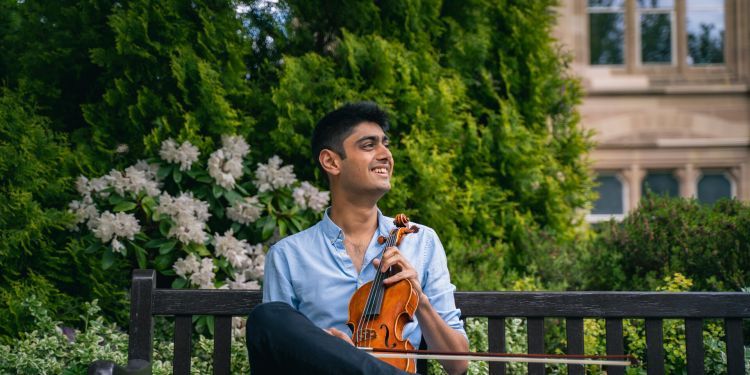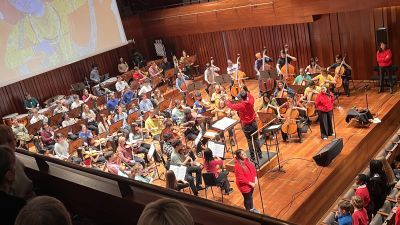
Breadcrumb navigation
LSSO Conductor in Residence Ammal Bhatia reflects on his year in the role

LSSO Conductor in Residence Ammal Bhatia reflects on his year in the role
The London Schools Symphony Orchestra (LSSO) Conductor in Residence scheme is run in partnership with Guildhall Young Artists and Black Lives in Music. Now in its fourth year, the residency for young conductors from underrepresented groups is designed to nurture talent and champion representation within the orchestra. The scheme gives a young conductor the chance to work with LSSO students during the orchestra’s Winter, Spring and Summer holiday courses, as well being offered one-to-one mentor support from professional conductors.
Ahead of his final concert with the orchestra, we caught up with 2024/25 LSSO Conductor in Residence Ammal Bhatia to hear more about his time in the role and how it’s changed him as a conductor and a musician. He also told us what audiences can expect from his upcoming final performance with the LSSO in September.
Could you tell us about your year as the LSSO Conductor in Residence?
The year has been phenomenal. I've worked with three amazing, but very different conductors, and it's quite interesting to see how your perspective changes looking through the lens of the conductor you're working with. Also, the orchestra has been fantastic, a really high standard ensemble. We've done ambitious repertoire and it's been a very high standard of concerts and music making. It's been fantastic.
Have there been any standout moments from your time in the role?

All three of the projects have been very different, not just to do with the difference in conductors I've been working with, but also the variety of repertoire. I think the Spring course, which took place in April, was quite different because we were also doing a Link Up outreach programme in partnership with Carnegie Hall. I ended up doing quite a lot of the conducting with that as, unfortunately, the conductor Christopher Warren Green was unwell for a couple of the rehearsals and as an assistant I had to step up to the plate, which is one of the things you've got to be ready to do. I was even thinking, "he's really not feeling very well, I might have to conduct the concert as well!" Fortunately, he was well enough to do the concert, but for me, rehearsing The Firebird and conducting it with full orchestra for the first time was pretty memorable. It was a standout moment for me.
How do you feel your time in the role has changed you as a conductor and/or a musician?
It's changed me a lot. First of all, I had to learn a lot of repertoire, which is a really important thing. As a conductor, it can be quite "theory-based" or "textbook based" if you're studying lots of scores but then you don't actually go and conduct them. So it's really great to be studying all this music and then get to work with musicians on it. I had a lot of time to learn the music as well, as each course is about a week and half to two weeks long, so I was able to really work on the scores and the music. I think I've definitely got a different approach to technical things in my conducting, having picked lots of little things up from the conductors I've worked with. The role also gave me an amazing chance to work on my rehearsal technique. There was a lot of rehearsal time for me to really work on how I was in rehearsals, how I wanted to pick things apart to make rehearsals have a bit of an arc to them. Working with young adults is also a skill in itself – it takes a bit of time to work out how to really work with young adults, but they can produce absolutely amazing results.
What impact do you hope your time with the LSSO has had on the young musicians?
Well, I hope they've enjoyed me being in this role – I've definitely enjoyed it! I think it's important to be as inspiring as you can, to be very engaging. You have to give a lot in rehearsals quite a lot of the time. There are lots of long days and the orchestra can get tired, we're all human, so it's very important to be human with them and connect with them. Sometimes it's easy to be a little bit too stark thinking "we're working on the music, we will work until 5pm", but you've got to be very human, adaptable and flexible.
What advice would you give to someone thinking about applying to be the next LSSO Conductor in Residence?
Definitely apply to be the next LSSO Conductor in Residence! They are a really fab orchestra of a very high standard. You'll do ambitious projects and while it might be your first time as a conductor doing these big projects, it's probably the orchestral players' first time doing these big projects as well, so you're in the same boat! That’s not likely to be the case when you start working with professional orchestras.
My other piece of advice is to prepare like mad, go in with an open mind, and start with your strengths but also focus on your weaknesses. I'm a violinist by trade, so I do a lot of work with the strings. But also, it's a really good opportunity to focus on your weaknesses. The orchestra's there and they're really responsive, which is very impressive for a youth orchestra – they're very adaptable and they're very kind. You can go in and you can make a mistake or do something and they'll be able to work with it. We're all learning and they're learning as well.
With your time in the role coming to an end, what's next for you professionally?
I'm going to be moving to Scotland next month to start my Masters at the Royal Conservatoire of Scotland with Martyn Brabbins. I'm really excited about that – there's lots of things to jump into like masterclasses, lessons, lots of repertoire and lots of music making.
And finally, could you tell us a bit about the piece you'll be conducting when the LSSO perform at Barbican Hall on 15 September?
Yes, I'm conducting a piece of music by Russian composer Anatoly Lyadov called The Enchanted Lake. It's brilliant because it's one of these pieces where you listen to it and there's a lot going on, and there sort of is, but then you look at the score and you realise it's amazingly orchestrated. It's a very beautiful eight minute piece of music, which doesn't have a melody, but is very singable.
Applications for the 2025/26 LSSO Conductor in Residence close on 5 September 2025. Details on how to apply can be found here.


